
5 Ways to Make School a Great Experience

Sep 11, 2017
The first week of September is over, your child's back in school, getting familiar with their environment, and adjusting to their new schedule. The switch from summer to school is a major transition for children with developmental disabilities. These developmental disabilities can include autism spectrum disorder, ADHD, and intellectual disabilities. The first few weeks can be quite difficult for them as they are getting into the swing of things. There are a number of little things you can do as a parent to help make sure that a positive association is being formed with going to school.
The following recommendations are generally quite beneficial. However, the specific strategies you implement will vary depending on your child's personality and diagnoses.
1. Pack sensory aids for school support
Based on your child's specific sensory needs and coping strategies, it may be helpful to have aids such as fidget spinners, chewing gum, stress balls, noise cancelling headphones or even a piece of yarn on your checklist when packing your child's schoolbag. These sensory tools help children with developmental disabilities regulate their sensory input and maintain focus throughout the school day.
2. Adjust arrival and departure times
The before and after hallway hustle can be a stimulus overload for many children with developmental disabilities. If possible try staggering their arrival and departure from the school so that they can avoid crowded hallways, loud announcements, and ringing bells. Small accommodations like these make the world of difference for sensory-sensitive students.
3. Plan your morning routine
In the mornings, time your child's wakeup so that there isn't a prolonged wait from when they are ready to when they leave. For many children with developmental disabilities, a wait between 7:30am and 8:00am is enough of a delay to cause anxiety and stress. Consistent morning routines help establish predictable patterns that support emotional regulation.
4. Stock up on medications and supplies
Communicate with your child's school to ensure any medications and supplies are stocked up, on hand, and ready for your child. This includes prescription medications, over-the-counter medications, and specialized medical supplies that your child may need during school hours.
5. Use technology as a positive reinforcement
Help your child to build a connection with going to school and the positive reinforcement of video games. For instance, using verbal and visual cues to associate the bus home from school with their Xbox. This behavioral strategy creates positive associations between school activities and preferred activities at home.
These tips will be beneficial for your child. However, the best thing you can do is make sure there is great communication between you, your school, and your agency. Active communication and a common understanding of your child's IPP (Individual Program Plan) is necessary to make sure they are comfortable, cared for, and integrated appropriately into their classrooms. The IPP is a personalized educational plan that outlines specific goals, accommodations, and support services for students with disabilities.
The transition for back to school is rarely without road bumps. We encourage parents not to feel overwhelmed or frustrated during the process. It can take a few weeks for your child to become comfortable and adjusted to their new routine. We wish you all the best for the school year!
